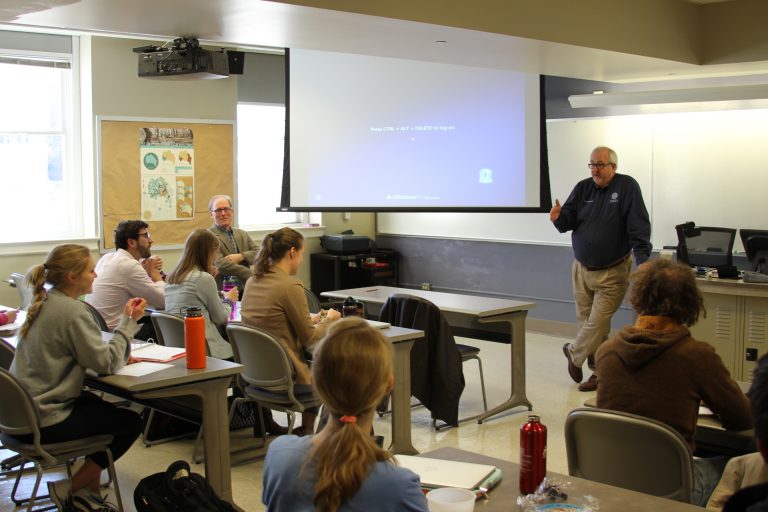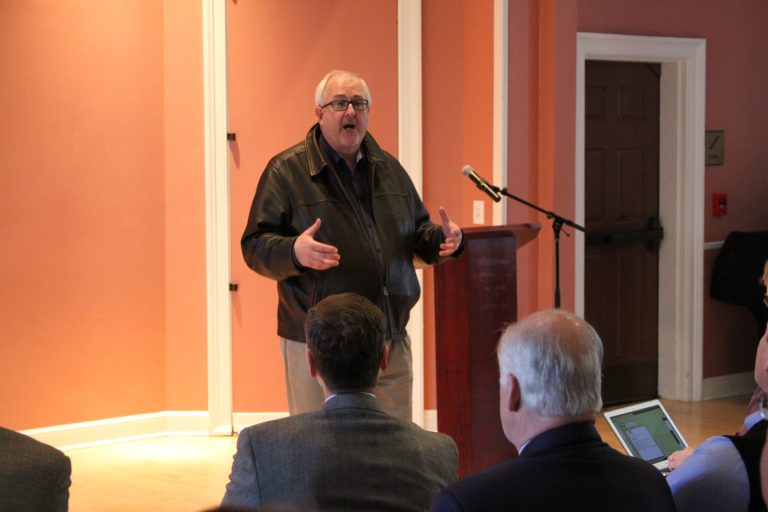The nation’s top emergency management official says that the ultimate goal of the public agency should be to lead the public toward a risk scenario that the private sector would underwrite, and to include the public more thoroughly in disaster response and recovery efforts.
Federal Emergency Management Agency (FEMA) Administrator Craig Fugate spoke at UNC-Chapel Hill on Feb. 17 as part of the Natural Hazards Resilience Speakers Series, hosted by the Coastal Resilience Center of Excellence. Fugate also spoke to a class led by Center Director Dr. Gavin Smith.

The speakers series is part of a partnership between the Coastal Resilience Center the Department of City and Regional Planning at UNC, which co-sponsor a graduate certificate program in the study of Natural Hazards Resilience. These additional talks focus on various topics related to natural hazards and disasters. To learn more about future speakers in the series, visit http://coastalresiliencecenter.unc.edu/crc-media/spring-2016-speakers-series.
Fugate, who has been Administrator since 2009, has promoted the “whole community” approach to emergency management, emphasizing and improving collaboration with all levels of government and external partners, including voluntary agencies, faith based organizations, the private sector and citizens.
In his discussions at UNC, he stressed that future development in disaster-prone areas should consider risk as a major factor in how to build.
“I’m not saying we don’t build, but we need to focus on how we build, “ Fugate said during his class discussion. “[It should be done] not just for profit, but for longer-term benefit.”
Fugate said that the public may not understand why some natural hazards are declared disasters by FEMA and others are not. As an example, he cited King County, Texas, an area prone to natural disasters.
“You can have a Cat 3 [storm] hit King County, Texas, and it’s not getting a disaster declaration,” he said. “If there’s nothing for a hazard to destroy, there’s no risk.”
Prior to coming to FEMA, Fugate served as Director of the Florida Division of Emergency Management. In 2004, he managed the largest federal disaster response in Florida history as four major hurricanes impacted the state in quick succession; Charley, Frances, Ivan and Jeanne. Fugate began his emergency management career as a volunteer firefighter, paramedic, and a Lieutenant with the Alachua County Fire Rescue.
Fugate said he supports risky development if builders are the ones assuming the bulk of the risk. Currently, federal flood insurance programs “socialize” the risk, he said, but if the private sector covered losses from flooding instead, building patterns would reflect long-term risk concerns.
“We cannot subsidize risk to the point at which behavior won’t change,” Fugate said.
Fugate’s advice for the students was to find something they are passionate about and stay with it, knowing that results from work in planning can be decades in the making.
“Don’t stop learning; don’t assume you have all of the answers,” he said. “When nobody is disagreeing with you – panic. Find someone who disagrees with you.”

During the public lecture, Fugate again underlined the importance of pricing risk at a point where behaviors change. He also stressed that effective emergency management involves greater trust in the public’s ability to respond to disasters and the government’s ability to better communicate on the local level.
“We have to demonstrate by doing, not talking, if we’re going to earn the public’s trust,” he said. “[We need to] go to people, meet them on their level, address their needs, and work from there.”
The government should not look at the public as untrained and unable to help, he said – this leads to government-centric problem-solving that does not work with large disasters. The quickest responses after a natural hazard are from neighbors helping neighbors, he said, and government needs to empower those people to help communities better respond and recover.
It often comes down to vocabulary, he said. Weather-related events are natural hazards, not disasters. The public is a resource, not a liability. After the storm, they are survivors, not victims.
Another major concern is crafting emergency response plans to fit the unique needs of each population. This includes the elderly, children, people with special needs, pets and others.
“Plan for the communities you live in, not what fits your plan,” Fugate said.
